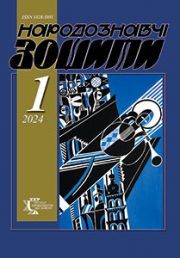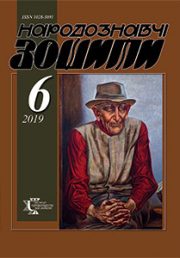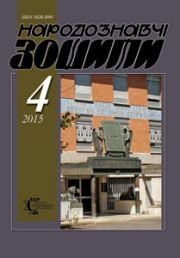The Ethnology Notebooks. 2022. № 2 (164), 385—390
UDK [398.81:329.7](=161.2)”19″
DOI https://doi.org/10.15407/nz2022.02.385
PAVLOVA Alla
- ORCID ID: https://orcid.org/0000-0001-6214-8738
- Candidate of Philological Sciences,
- Docent, doctoral student,
- Kyiv National University
- named after Taras Shevchenko,
- the Department of Folklore
- Institute of Philology,.
- 31, University Str., 08200,
- Irpin, Kyiv region, Ukraine,
- Contacts: e-mail: Lypen.pavlova@ukr.net
Abstract. Songs about the national liberation struggle of Ukrainians in the middle of the twentieth century were the subject of research by a number of modern folklorists, who brought to scientific circulation the little-known texts created by participants of national competitions and their relatives, sweethearts, friends, ideological supporters as well as eyewitnesses of the events of this period, descendants, etc. The people’s liberation struggle of Ukrainians of the twentieth century is presented by researchers in the receptive representation of the heroes of folklore, through a deep understanding of the truth-good-freedom triad, the philosophical problem «I» and «Other», the meaning of human existence, the tragic paradigm, ambivalence of love and more.
Rebel songs are diverse in subject matter, genre, poetic structure, and because these folk samples are «traces of living facts», extremely important are the features of the narrative, the existence of the narrator, his experience of being in all its diversity and immensity.
The aim of the article is to study the existential consciousness at the level of worldview in lyrical-epic songs about the national liberation struggle of the Ukrainian people in the middle of the twentieth century.
The object of research is lyric-epic songs, the texts of which are included in the collections of Ukrainian folklore of the XX century.
The subject of research is the existential consciousness of the narrator in terms of worldview, presented in the rebel lyric-epic songs.
Research methods: the analytical method is used during the selection of features of existential consciousness. The descriptive method is involved in considering the theoretical aspects of the topic. A comparative method is used to clarify the spiritual universe of the narrator.
Keywords: lyric-epic songs, existential consciousness, narrator, national liberation struggle, rebel songs, text, social and domestic event, worldview.
Received 20.04.2022
REFERENCES
- Demyan, G. (2003). Ukrainian insurgent songs of 1940—2000 (historical and folklore research). Lviv: Galician Publishing Union [in Ukrainian].
- Kobylyansky, V. (2013). Music in the life of Ukrainian insurgents in the Carpathians (second half of the 1940 — early 1950). Galicia (Part 24, pp. 331—343). Retrieved from: http://nbuv.gov.ua/UJRN/Nikp_2013_24_47 (Last accessed: 20.09.2021) [in Ukrainian].
- Lun’o, E. (1999). People and Motherland in insurgent songs. (Based on factual materials from Yavoriv region). Ethnographic notebooks, 3, 323—325 [in Ukrainian].
- Lun’o, E. (2007). Satire on Hitler’s army in insurgent songs. The way of liberation, 10 (715), 76—96 [in Ukrainian].
- Lun’o, E. (2008). Nazi occupation orders in the Ukrainian countryside through the prism of folk satire. Ukrainian liberation movement. Center for the Study of the Liberation Movement, IU. I. Krypyakevych of the National Academy of Sciences of Ukraine, 12, 204—218 [in Ukrainian].
- Lun’o, E. (1999). Stepan Bandera in the song folklore of Yavoriv region. The way of liberation, 10, 1201—1210 [in Ukrainian].
- Kuzmenko, O. (2018). Dramatic human existence in Ukrainian folklore: conceptual forms of expression (period of the First and Second World Wars): monograph. Lviv: Institute of Ethnology of the National Academy of Sciences of Ukraine [in Ukrainian].
- Kuzmenko, O. (2017). The concept of «Enemy» in the interpretive paradigm of twentieth-century folklore. Ethnographic notebooks, 5 (137), 1086—1096 [in Ukrainian].
- Shinkaruk, V.I. (2002). Philosophical encyclopedic dictionary: encyclopedia. Kyiv: Abris [in Ukrainian].
- Baudrillard, J. (1996). Simulacra and simulation (abstract W. Furs). Philosophy of the postmodern era: Sat. translations and abstracts (Pp. 32—47). Minsk: Izd. Krasiko-Print LLC [in Russian].
- Jaspers, K. (2014). Mind and existence. Moscow: Rehabilitation [in Russian].
- Pavlova, A.K. (2015). Existential-aesthetic imperative in Ukrainian folk culture: the specifics of the border situation. Literary Studies. Folklore. Culturology: a collection of scientific papers (Issue 18—20, pp. 42—50). Cherkasy: Publisher Chabanenko Yu.A. [in Ukrainian].
- Lavrishin, Z. (Ed.). (1996—1997). Chronicle of the Ukrainian Insurgent Army. Songs of the Ukrainian Insurgent Army (Vol. 25). Toronto; Lviv: Chronicle of the Ukrainian Insurgent Army [in Ukrainian].
- Husserl, E. (2004). The crisis of European sciences and transcendental phenomenology. St. Petersburg: Vladimir Dahl [in Russian].
- Frank, S.L. (1917). The soul of Man. Experience of introduction to philosophical psychology. Moscow [in Russian].
- Pukivsky, Yu. (2016). Insurgent songs from the voice of Sofia Parpan from the village of Dolynyany, Rohatyn district, Ivano-Frankivsk region. Mythology and Folklore: All-Ukrainian scientific and educational journal, 3—4, 118—124 [in Ukrainian].
- Frankl, W. (1990). Man in search of meaning. Moscow: Progress [in Russian].
- Heidegger, M., Bibikhin, V.V., & Akhutin, A.V. (1989). Basic concepts of metaphysics. Questions of philosophy, 9, 116—157 [in Russian].
- Bury, A. (2012). To the problem of anthropological dimensions of the ontology of existentialism. Scientific notes of Ostroh Academy National University. Philosophy, 182, 26—40 [in Ukrainian].
- Kierkegaard, C., Isaeva, N., & Isaeva, S. (2005). The final non-scientific afterword to «Philosophical crumbs». Bulletin of Europe, 16. Retrieved from: http://magazines.russ.ru/vestnik/2005/16/index-pr.html (Last accessed: 16.12.2021) [in Russian].







